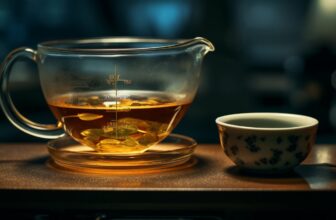
Arnica tea is a natural remedy with numerous health benefits, making it a popular choice for those seeking relief from pain and inflammation. This herbal tea is known for its healing properties, particularly when used externally. It can reduce inflammation, alleviate muscle pain, and help heal bruises and sprains. Arnica tea contains compounds such as sesquiterpene and dihydrohelenalin, which have antibacterial and anti-inflammatory properties. Additionally, it can stimulate hair growth, regenerate tissue, and aid in treating various skin problems like scars, eczema, and itching.
Key Takeaways:
- Arnica tea is a natural remedy with numerous health benefits for pain and inflammation relief.
- When used externally, arnica tea can reduce inflammation, alleviate muscle pain, and help heal bruises and sprains.
- Compounds in arnica tea, such as sesquiterpene and dihydrohelenalin, have antibacterial and anti-inflammatory properties.
- Arnica tea can stimulate hair growth, regenerate tissue, and aid in treating skin problems like scars, eczema, and itching.
- It is important to use arnica tea externally and not consume it internally without medical supervision due to potential toxicity and side effects.
The Medicinal Properties of Arnica Tea
The medicinal properties of arnica tea are attributed to its unique combination of compounds, including sesquiterpene and dihydrohelenalin. These compounds have been found to have antibacterial and anti-inflammatory effects, making arnica tea a popular natural remedy for various ailments.
One of the key uses of arnica tea is its ability to reduce inflammation. The anti-inflammatory properties of arnica tea can help alleviate pain and swelling associated with conditions like arthritis and inflammatory skin conditions. It can also promote the healing of bruises and sprains.
Arnica tea is also known for its pain-relieving properties. When applied topically, it can help alleviate muscle pain, joint pain, and general body aches. Many athletes and individuals suffering from chronic pain have found relief by using arnica tea externally.
Additionally, arnica tea has shown potential in promoting hair growth and improving skin health. It can stimulate blood circulation to the scalp, which nourishes the hair follicles and promotes stronger and healthier hair. When used topically, arnica tea can also help with various skin problems, such as scars, eczema, and itching.
The Medicinal Properties of Arnica Tea
| Medicinal Properties | Benefits |
|---|---|
| Anti-inflammatory | Reduces inflammation, alleviates pain and swelling |
| Pain-relieving | Alleviates muscle pain, joint pain, and body aches |
| Hair-stimulating | Promotes hair growth and strengthens hair |
| Skin-healing | Helps with scars, eczema, itching, and other skin problems |
“Arnica tea has been a game-changer for me. It’s incredibly soothing and has significantly reduced the pain and swelling in my joints. I highly recommend giving it a try!” – Sarah, arnica tea user
It is important to note that while arnica tea has numerous benefits, it should only be used externally and under medical supervision. Consuming arnica tea internally can be toxic and cause various side effects. Always consult with a healthcare professional before using arnica tea or any herbal remedy.
Arnica Tea for Pain Relief
If you’re looking for a natural way to relieve pain, arnica tea may be the answer. This herbal remedy has been used for centuries to alleviate muscle pain, joint discomfort, and general body aches. The soothing effects of arnica tea can provide much-needed relief without relying on over-the-counter pain medication.
The key to arnica tea’s pain-relieving properties lies in its anti-inflammatory compounds. Arnica tea contains sesquiterpene and dihydrohelenalin, which have been found to have antibacterial and anti-inflammatory effects. These compounds work together to reduce inflammation in the body, helping to alleviate pain and promote healing.
To use arnica tea for pain relief, you can either apply it externally or use it as a compress. For muscle pain or joint discomfort, you can soak a cloth in warm arnica tea and apply it directly to the affected area. The warmth and healing properties of the tea can help ease the pain and reduce swelling.
However, it’s crucial to note that arnica tea should only be used externally and under medical supervision. While it is generally safe when used topically, consuming arnica tea internally can be toxic and cause various side effects. It’s always best to consult with a healthcare professional before using arnica tea for pain relief.
| Benefits of Arnica Tea for Pain Relief: |
|---|
| Reduces inflammation in the body |
| Alleviates muscle pain and joint discomfort |
| Promotes healing and recovery |
| Provides natural pain relief without relying on medication |
Arnica Tea for Inflammation
Inflammation is a common problem that can cause discomfort and hinder healing, but arnica tea may offer a solution. This natural remedy has been used for centuries to reduce inflammation and promote the body’s natural healing processes.
Arnica tea contains compounds such as sesquiterpene and dihydrohelenalin, which have antibacterial and anti-inflammatory properties. These compounds help to reduce swelling, relieve pain, and support the body’s immune response. By drinking arnica tea or applying it topically, you can harness these healing benefits.
When using arnica tea for inflammation, it’s important to follow proper guidelines and use it externally only. Applying arnica tea directly to the affected area can help soothe joint pain, muscle soreness, bruises, and sprains. You can create a compress by steeping a tea bag in warm water and applying it to the affected area for 15-20 minutes.
| Benefits of Arnica Tea for Inflammation: |
|---|
| Reduces swelling and inflammation |
| Relieves joint pain and muscle soreness |
| Aids in the healing of bruises and sprains |
However, it’s important to note that arnica tea should be used under medical supervision and with caution. While it can be a beneficial natural remedy, it can also be toxic and cause side effects if taken internally or used improperly. Always consult with a healthcare professional before incorporating arnica tea into your wellness routine.
Arnica Tea for Skin Health
Your skin deserves the best care, and arnica tea may be a natural remedy to improve its health and appearance. This herbal tea is known for its healing properties, particularly when used externally. Arnica tea contains compounds such as sesquiterpene and dihydrohelenalin that have antibacterial and anti-inflammatory properties, making it a popular choice for various skin problems.
When applied topically, arnica tea can help with scars, eczema, and itching. Its anti-inflammatory properties can reduce redness and swelling, while its antibacterial properties can help prevent infections. Arnica tea can also promote tissue regeneration, allowing your skin to heal faster and more efficiently.
If you’re dealing with skin issues, try incorporating arnica tea into your skincare routine. You can apply it as a compress or use it in homemade skincare products. However, it’s important to note that arnica tea should only be used externally and not consumed internally without medical supervision. Internal consumption of arnica tea can be toxic and cause various side effects. Always consult with a healthcare professional before using arnica tea for any purpose.
| Benefits of Arnica Tea for Skin Health: | How to Use Arnica Tea for Skin Health: |
|---|---|
|
|
Arnica Tea for Hair Growth
If you’re looking for a natural way to boost hair growth, arnica tea could be the secret ingredient your hair care routine needs. This herbal tea is known for its ability to stimulate blood circulation in the scalp, which can promote healthier hair follicles and encourage hair growth. The anti-inflammatory and antibacterial properties of arnica tea also contribute to its potential benefits for hair health.
Arnica tea is rich in compounds like sesquiterpene and dihydrohelenalin, which have been found to have healing effects on the scalp and hair. These compounds can help reduce inflammation, soothe the scalp, and improve overall hair health. Regular use of arnica tea as a hair rinse or topical treatment may help strengthen the hair follicles and reduce hair loss.
To incorporate arnica tea into your hair care routine, you can brew a strong cup of arnica tea and allow it to cool before using it as a final hair rinse after shampooing and conditioning. Gently massage the tea into your scalp and let it sit for a few minutes before rinsing it out. You can also mix arnica tea with natural oils like coconut or jojoba oil and apply it directly to your scalp as a nourishing hair mask.
The Potential Benefits of Arnica Tea for Hair Growth
- Promotes blood circulation in the scalp
- Reduces inflammation and soothes the scalp
- Strengthens hair follicles and reduces hair loss
- Nourishes the scalp and promotes healthier hair growth
“Arnica tea has been used for centuries as a natural remedy for various hair and scalp conditions. Its potential to improve blood circulation and reduce inflammation makes it an attractive option for those seeking to enhance hair growth and maintain healthy locks.” – HairCareExpert101
| Ingredients | Instructions |
|---|---|
| 1 cup of dried arnica flowers | 1. Boil 2 cups of water and remove from heat. 2. Add dried arnica flowers to the hot water. 3. Cover and steep for 20 minutes. 4. Strain the tea and let it cool. 5. Use the tea as a final hair rinse or mix with oil for a hair mask. 6. Massage into scalp, leave on for a few minutes, and rinse thoroughly. |
While arnica tea can offer potential benefits for hair growth and scalp health, it is important to note that individual results may vary. It is also crucial to use arnica tea externally and avoid consuming it orally without proper medical supervision. If you experience any adverse reactions or irritation, discontinue use and consult a healthcare professional.
When it comes to using arnica tea for its healing properties, external application is the way to go. Arnica tea has been widely recognized for its ability to reduce inflammation, alleviate muscle pain, and promote the healing of bruises and sprains. But it’s important to note that arnica tea should only be used topically and not ingested without the guidance of a medical professional. This powerful herbal tea contains compounds like sesquiterpene and dihydrohelenalin, which possess antibacterial and anti-inflammatory properties.
One of the most common uses of arnica tea externally is for relieving muscle soreness and pain. When applied as a compress or poultice, arnica tea can help soothe tired muscles and reduce discomfort. Its anti-inflammatory properties can also aid in the healing process by reducing swelling and promoting faster recovery.
Arnica tea is not only beneficial for sore muscles but can also be used as a natural remedy for various skin conditions. It can help with scar healing, eczema, and itching due to its regenerative properties. Applying arnica tea-infused products or using a diluted solution as a compress can provide relief and promote healthier skin.
To make the most of arnica tea’s healing properties, it’s essential to use it externally in the correct manner. Whether you’re dealing with muscle soreness, pain, bruises, or sprains, creating a compress by soaking a cloth in arnica tea and applying it to the affected area can be effective. Remember to always consult a healthcare professional before using arnica tea, especially if you have any underlying medical conditions or are taking medications.
In summary, while arnica tea has a range of potential benefits when used externally, it is crucial to exercise caution and seek proper guidance. The healing properties of arnica tea can provide relief for muscle soreness, pain, and various skin issues. However, it should never be ingested internally without medical supervision, as it can be toxic and lead to adverse effects. By using arnica tea externally and following recommended guidelines, you can harness its natural healing power and promote overall well-being.
| Benefits of Arnica Tea for External Use |
|---|
| Reduces inflammation |
| Alleviates muscle pain |
| Heals bruises and sprains |
| Promotes scar healing |
| Relieves eczema and itching |
Conclusion
Arnica tea offers a range of health benefits, but it is crucial to use it externally and consult with a healthcare professional for proper guidance and dosage.
Known for its healing properties, arnica tea has been used for centuries to alleviate various ailments. When applied topically, it can help reduce inflammation, relieve muscle pain, and aid in the healing of bruises and sprains. This is thanks to the antibacterial and anti-inflammatory compounds found in arnica tea, such as sesquiterpene and dihydrohelenalin.
Not only does arnica tea offer external benefits, but it can also promote hair growth, stimulate tissue regeneration, and assist in improving skin health. Its potential to address skin issues like scars, eczema, and itching makes it a popular choice for natural remedies.
However, it is important to note that arnica tea should only be used externally. Internal consumption without medical supervision can be toxic and lead to various side effects. To ensure safe and effective use, it is best to consult with a healthcare professional who can provide guidance on proper usage and dosage for your specific needs.
FAQ
Q: What is arnica tea good for?
A: Arnica tea is known for its healing properties, particularly when used externally. It can reduce inflammation, alleviate muscle pain, and heal bruises and sprains. Additionally, arnica tea can stimulate hair growth, regenerate tissue, and help with various skin problems like scars, eczema, and itching.
Q: What are the medicinal properties of arnica tea?
A: Arnica tea contains compounds such as sesquiterpene and dihydrohelenalin that have antibacterial and anti-inflammatory properties. These properties contribute to its healing effects.
Q: How does arnica tea help with pain relief?
A: Arnica tea can help alleviate muscle pain, joint pain, and general body aches. When applied externally, it can provide relief from various types of pain.
Q: Does arnica tea reduce inflammation?
A: Yes, arnica tea has anti-inflammatory properties and can help reduce inflammation in the body. It may be beneficial for conditions like arthritis and inflammatory skin conditions.
Q: Can arnica tea improve skin health?
A: Yes, arnica tea has potential benefits for skin health. It can help with various skin problems like scars, eczema, and itching. However, it should be used externally and not consumed internally without medical supervision.
Q: Does arnica tea stimulate hair growth?
A: Yes, arnica tea can stimulate hair growth. It promotes blood circulation to the scalp, which can lead to stronger and healthier hair.
Q: How should arnica tea be used externally?
A: Arnica tea can be applied externally for maximum benefit. It can be used for muscle soreness, pain relief, bruises, and sprains. However, it is important to follow guidelines and use arnica tea under medical supervision.
Q: Is arnica tea safe to consume internally?
A: No, arnica tea should not be consumed internally without medical supervision. It can be toxic and cause various side effects. It is best used externally for its healing properties.





